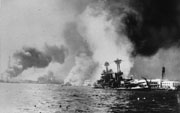VOA标准英语2011--70th Anniversary of Pearl Harbor Approaches
时间:2019-02-04 作者:英语课 分类:VOA标准英语2011年(十二月)
70th Anniversary of Pearl Harbor Approaches
On Dec. 7, 1941, the Imperial Japanese Navy staged a surprise attack on the U.S. naval 1 base at Pearl Harbor. Five U.S. battleships sank or were severely 2 damaged, several hundred warplanes were destroyed and more than 2,400 people died.
In an historic speech, President Franklin D. Roosevelt called it "a date which will live in infamy 3."
As the United States prepares to mark the 70th anniversary of Pearl Harbor, two new books revisit the the most devastating 4 foreign attack on U.S. soil until the Sept. 11 terror attacks in 2001.
Days that changed America
Historian Craig Shirley was born more than a decade after the end of World War II, but the war was ever-present during his childhood.
“I grew up in a family, a culture, where the point of reference for everybody in conversation was, before the war, during the war, and after the war." Shirley recalls. "Everybody in my family had been involved directly in the war, whether civilian 5 or military.”

The USS California, right, after being struck by a torpedo 6 and a bomb during the Japanese attack on Pearl Harbor on Dec. 7, 1941.
President Roosevelt had resisted joining the war in Europe. He had been re-elected to a third term. The nation was gradually climbing out of the Great Depression.
“Franklin Roosevelt made public speeches saying to American mothers, ‘I’m not going to send your boys to fight a European war,'" Shirley says.
But all that changed when Japan attacked Pearl Harbor. In his book, "December 1941: 31 Days That Changed America and Saved the World," Shirley dedicates each chapter to a day, starting on Dec. 1.
On Dec. 8, President Roosevelt addressed a joint 7 session of Congress with his famous speech.
“Everything stopped at about one o’clock in the afternoon," Shirley says. "Everybody gathered around their radios, in their homes, in their libraries, in their churches. There were radio repair stores all over America that had radios out in front of their stores. They would have them on for passersby 8 to listen to. The stock market stopped. Everybody stopped to listen to the president of the U.S.”
Forty minutes later, Congress declared war against Japan. On Dec. 11, Germany declared war on the U.S. and America joined the battle.
Going to war, Shirley says, changed America.
“Women built airplanes, tanks and learned how to become firefighters," he says. The nation’s capital changed overnight.
“Tens of thousands of civilians 9 and military personnel come into the city," Shirley explains. "New buildings sprang up every place. All the federal buildings have machine guns on top of them. There are navy and marine 10 armed guards stationed at the entrance to every federal building in Washington, the Capitol, the White House, the State Department.”
America as a global power
While Shirley focuses mostly on what happened in the United States, another book, “December 1941: Twelve Days that Began a World War," offers an international perspective.
“The 12 days are really pivotal in terms of the war as a whole and in the 20th century as well," says author Evan Mawdsley, a history professor at the University of Glasgow. “In fact, the Japanese attacked the British before they attacked Pearl Harbor by about half an hour, when they attacked Malaya. The reason why they attacked Pearl Harbor is because they wanted to make sure that the American navy couldn’t intervene in their invasion of Malaya.”
According to Mawdsley, the world after Dec. 7 became fundamentally different from the world just one day before.
“America as a global power, the real beginning of that, I think, does date back to the shock of Pearl Harbor," he explains. "Up till that time, the whole fate of the world was determined 11 by the European powers. And from the first days of December, all of a sudden, the way it operates has become global. You could argue, I think, that the globalization almost dates back to this period of time.”
- He took part in a great naval battle.他参加了一次大海战。
- The harbour is an important naval base.该港是一个重要的海军基地。
- He was severely criticized and removed from his post.他受到了严厉的批评并且被撤了职。
- He is severely put down for his careless work.他因工作上的粗心大意而受到了严厉的批评。
- They may grant you power,honour,and riches but afflict you with servitude,infamy,and poverty.他们可以给你权力、荣誉和财富,但却用奴役、耻辱和贫穷来折磨你。
- Traitors are held in infamy.叛徒为人所不齿。
- It is the most devastating storm in 20 years.这是20年来破坏性最大的风暴。
- Affairs do have a devastating effect on marriages.婚外情确实会对婚姻造成毁灭性的影响。
- There is no reliable information about civilian casualties.关于平民的伤亡还没有确凿的信息。
- He resigned his commission to take up a civilian job.他辞去军职而从事平民工作。
- His ship was blown up by a torpedo.他的船被一枚鱼雷炸毁了。
- Torpedo boats played an important role during World War Two.鱼雷艇在第二次世界大战中发挥了重要作用。
- I had a bad fall,which put my shoulder out of joint.我重重地摔了一跤,肩膀脫臼了。
- We wrote a letter in joint names.我们联名写了封信。
- He had terrorized Oxford Street,where passersby had seen only his footprints. 他曾使牛津街笼罩了一片恐怖气氛,因为那儿的行人只能看到他的脚印,看不到他的人。 来自英汉 - 翻译样例 - 文学
- A person is marceling on a street, watching passersby passing. 街边烫发者打量着匆匆行人。
- the bloody massacre of innocent civilians 对无辜平民的血腥屠杀
- At least 300 civilians are unaccounted for after the bombing raids. 遭轰炸袭击之后,至少有300名平民下落不明。
- Marine creatures are those which live in the sea. 海洋生物是生存在海里的生物。
- When the war broke out,he volunteered for the Marine Corps.战争爆发时,他自愿参加了海军陆战队。
- I have determined on going to Tibet after graduation.我已决定毕业后去西藏。
- He determined to view the rooms behind the office.他决定查看一下办公室后面的房间。